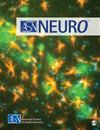C5a Increases the Injury to Primary Neurons Elicited by Fibrillar Amyloid Beta
IF 3.9
4区 医学
Q2 NEUROSCIENCES
引用次数: 31
Abstract
C5aR1, the proinflammatory receptor for C5a, is expressed in the central nervous system on microglia, endothelial cells, and neurons. Previous work demonstrated that the C5aR1 antagonist, PMX205, decreased amyloid pathology and suppressed cognitive deficits in two Alzheimer's Disease (AD) mouse models. However, the cellular mechanisms of this protection have not been definitively demonstrated. Here, primary cultured mouse neurons treated with exogenous C5a show reproducible loss of MAP-2 staining in a dose-dependent manner within 24 hr of treatment, indicative of injury to neurons. This injury is prevented by the C5aR1 antagonist PMX53, a close analog of PMX205. Furthermore, primary neurons derived from C5aR1 null mice exhibited no MAP-2 loss after exposure to the highest concentration of C5a tested. Primary mouse neurons treated with both 100 nM C5a and 5 µM fibrillar amyloid beta (fAβ), to model what occurs in the AD brain, showed increased MAP-2 loss relative to either C5a or fAβ alone. Blocking C5aR1 with PMX53 (100 nM) blocked the loss of MAP2 in these primary neurons to the level seen with fAβ alone. Similar experiments with primary neurons derived from C5aR1 null mice showed a loss of MAP-2 due to fAβ treatment. However, the addition of C5a to the cultures did not enhance the loss of MAP-2 and the addition of PMX53 to the cultures did not change the MAP-2 loss in response to fAβ. Thus, at least part of the beneficial effects of C5aR1 antagonist in AD mouse models may be due to protection of neurons from the toxic effects of C5a.C5a增加纤维淀粉样蛋白引起的原代神经元损伤
C5aR1是C5a的促炎受体,在中枢神经系统的小胶质细胞、内皮细胞和神经元上表达。先前的研究表明,C5aR1拮抗剂PMX205在两种阿尔茨海默病(AD)小鼠模型中降低淀粉样蛋白病理并抑制认知缺陷。然而,这种保护的细胞机制尚未得到明确证明。在这里,外源性C5a处理的原代培养小鼠神经元在处理后24小时内以剂量依赖的方式显示MAP-2染色的可重复性丧失,表明神经元损伤。这种损伤可由C5aR1拮抗剂PMX53预防,PMX53是PMX205的类似物。此外,C5aR1缺失小鼠的原代神经元在暴露于最高浓度的C5a后没有出现MAP-2丢失。用100 nM C5a和5µM纤维淀粉样蛋白β (fAβ)处理的原代小鼠神经元,以模拟AD大脑中发生的情况,显示相对于单独使用C5a或fAβ, MAP-2损失增加。用PMX53 (100 nM)阻断C5aR1可将这些初级神经元中MAP2的丢失阻断至单独使用fAβ时的水平。对C5aR1缺失小鼠的原代神经元进行的类似实验显示,由于fAβ处理,MAP-2缺失。然而,在培养物中添加C5a并没有增加MAP-2的丢失,在培养物中添加PMX53也没有改变MAP-2响应fAβ的丢失。因此,C5aR1拮抗剂在AD小鼠模型中的至少部分有益作用可能是由于保护神经元免受C5a的毒性作用。
本文章由计算机程序翻译,如有差异,请以英文原文为准。
求助全文
约1分钟内获得全文
求助全文
来源期刊

ASN NEURO
NEUROSCIENCES-
CiteScore
7.70
自引率
4.30%
发文量
35
审稿时长
>12 weeks
期刊介绍:
ASN NEURO is an open access, peer-reviewed journal uniquely positioned to provide investigators with the most recent advances across the breadth of the cellular and molecular neurosciences. The official journal of the American Society for Neurochemistry, ASN NEURO is dedicated to the promotion, support, and facilitation of communication among cellular and molecular neuroscientists of all specializations.
 求助内容:
求助内容: 应助结果提醒方式:
应助结果提醒方式:


